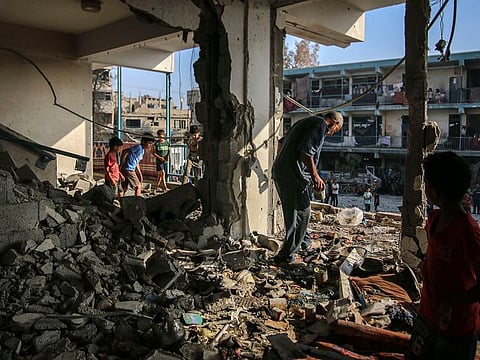Eight months of Gaza war highlights catastrophic human impact
Human beings haven’t seen such catastrophic mayhem and scale of devastation since WWII

As the Gaza war enters its eighth month today, the grim reality of what it has so far wrought on its victims calls to mind a quote from Noam Chomsky’s book, Gaza in Crisis: Israel’s War Against the Palestinians — a quote as apt today as it was when the book was published in 2010 — that put in a nutshell the conflict between a ghettoised Palestine and a brisling-with-arms Israel: “Inflicting pain on Palestinians for political ends is another long-standing doctrine of state terror — in fact its guiding principle”.
As people went on to watch for themselves this long-standing doctrine enacted on a public stage in Gaza, with its leitmotif of blood and fire growing more insistent, more brutish, more ferocious as the months passed, they watched in horror.
Never since the Second War War has a community of human beings had such catastrophic mayhem unleashed on it, for the scale of devastation inflicted on Gaza, probably the most densely populated strip of land on the planet, has been so unimaginable that the mind boggles at contemplating its lunacy, its cruelty, its vindictiveness.
Gaza is now, as if you need reminding, but a heap of rubble, with its homes, schools, hospitals, shops, marketplaces, mosques, libraries and other civilian structures blown apart — even though these sites were explicitly protected by the Geneva Conventions.
So sweeping has been that devastation that were today the 1.9 million Gazans internally displaced by the war (which is more than 85 per cent of the population) to “return to their homes”, they will literally have nowhere to go.
When will this mayhem end?
Last week Israel warned that the war it is waging on the people of this little, tormented strip of land — where 2.4 million people are squeezed into its 140 square miles, sinking deeper into famine — will stretch, in the words of its government’s National Security Adviser, Izachi Hanegi, “for seven more months”, the projected time it needs to “achieve its objectives”.
And we are left to imagine the horrors that lie ahead — that is, unless the war is brought to an end by the powers that be — and those powers sit behind the Resolute Desk in the Oval Office in Washington, embodied in the person of President Joe Biden, who is yet to convince himself, as other world leaders have already convinced themselves, that Israel is violating international law at every twist and turn in its conduct of this dreadful war.
Yet, dreadful as it is, this war has had unintended consequences. People around the world have now come to see in the particularity of the Palestinian struggle for freedom a universalist vision of emancipation, a view expressed vociferously by students, encamped on the quds and lawns of campuses all the way from Australia to France and from Ireland to — yes, finally — the United States, chanting the lyrics of Palestinian songs, waving Palestinian flags and wearing Palestinian keffiyehs.
In short, the question of Palestine is now no longer the question of a mere localised conflict, but an epistemic framework through which the paradigms of sundry emancipatory movements lay anchor and feel at home.
Forget band aids
Those who want to solve the conflict between the people of Palestine and the people of Israel must begin by going to the root cause of that conflict. And that lies in the history of the conflict.
This is a fact that UN Secretary General Antonio Gutterres was fully cognizant of when, soon after Hamas attack on Oct. 7, he observed: “It is important to recognise that the attacks did not occur in a vacuum.
The Palestinian people have been subjected to 56 years of suffocating occupation. They have seen their land steadily devoured by settlements and plagued by violence; their economy stifled; their people displaced and their homes demolished”.
When the people of Palestine feel constrained by occupation, it's natural for them to seek freedom with unbroken spirit.
— Fawaz Turki is a noted academic, journalist and author based in Washington DC. He is the author of The Disinherited: Journal of a Palestinian Exile
Sign up for the Daily Briefing
Get the latest news and updates straight to your inbox



